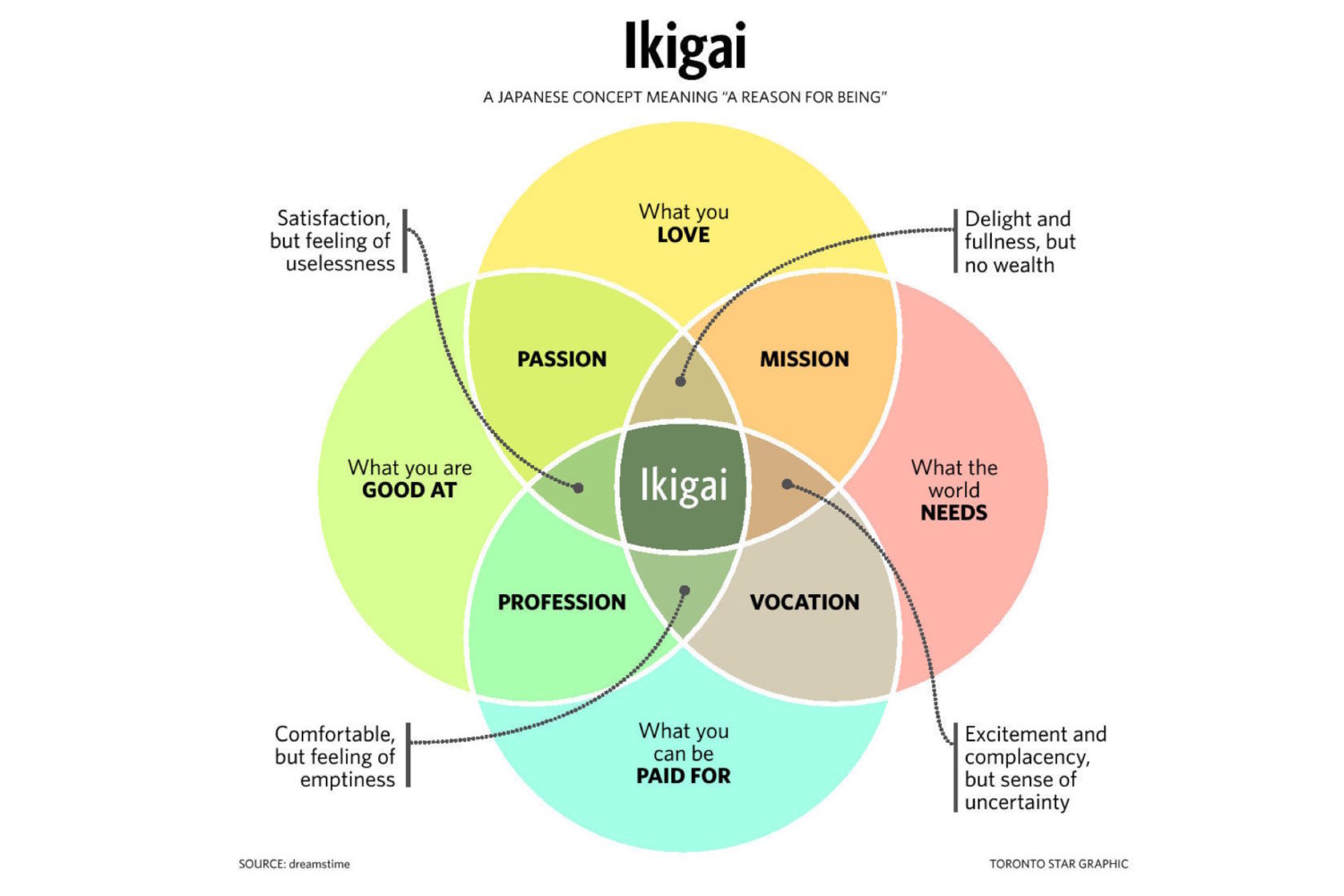Ikigai is a term that derives from two Japanese words: iki meaning “life; alive” and kai meaning “result; worth; benefit”.
It can be translated into a “reason for living; meaning for life”. It is the Japanese version of la raison d’être. It is however a lot more used and common in Japanese culture than in France, and has even been linked by researchers to lower mortality risks.
When you find your ikigai, you find purpose to your life, to the things you spend time on, and the people you are with. It is a mindset very close to positive psychology that allows people to find value and meaning. Individuals who found their ikigai see the big picture, have a goal in mind, and know the why behind what they do. It is a mental process that requires a lot of introspection into someone’s own sense of self.

The core of ikigai can be found at the junction of your passion, your mission, your vocation, and your profession:
- Your passion is what you’re good at and what you love
- Your mission is what you love and what the world needs
- Your vocation is what the world needs and what you can be paid for
- Your profession is what you can be paid for and what you’re good at
It applies to all aspects of life: work, family, activities, hobbies, etc. Here’s an easy guide you can use to find yours.
Step 1 – a non-exhaustive list of questions to answer
How to find what you love
- What is the most important to you in life?
- What are your values and how do you use them every day?
- Who are the people you love spending time with?
- What is your goal in life?
- What makes you smile?
- Where do you find beauty?
- What bodily sensations do you feel when you are happy?
- What makes you calm?
- What would you like to learn that you don’t know yet?
How to find what the world needs
- How do you help others?
- What could people do more/differently?
- What is the world lacking of?
- What will you leave behind you?
- How could you be more involved in your community?
How to find what you can be paid for
- How much money do you need per month to cover your needs?
- What would you do with more money?
- What type of employment would you want: part-time or full-time? temporary or permanent? employee, freelance, or business owner?
- What work environment would you be happier in: working from home, having your own office, or in an open space?
- What are the jobs that require the skills you already have? (see “what you are good at”)
- What is important to you in the company you work for?
- How do your company/the people who pay you match your values?
How to find what you are good at
- What activities do you do in your personal time?
- What is easy for you?
- What are your achievements?
- What do you enjoy doing the most in life?
- What are your strengths?
- What does success mean to you?
Step 2 – link the answers to each other & summarise
Put 1) and 2) together to find your mission; 2) and 3) for your vocation; 3) and 4) for your profession; and 4) and 1) for your passion.
For each of the 4 parts, find what notions, values, behaviours, beliefs, etc. are present in both components. Once you’ve identified the common themes, write a statement with those for your mission, vocation, profession and passion.
Step 3 – summarise again
The final stage is to put the 4 statements together in one sentence or small paragraph. Identify how they link to each other. Do they fit together or do you need to re-write them? Whatever works for you.
This process takes a lot time to go through. Depending on where you are in your life, your answers might change. The most important is that at any given time, you are able to remember what your purpose is in this life, and share it with others to inspire them to do the same. You will define the essence of what makes you happy. You will know your sense of life worth living.

